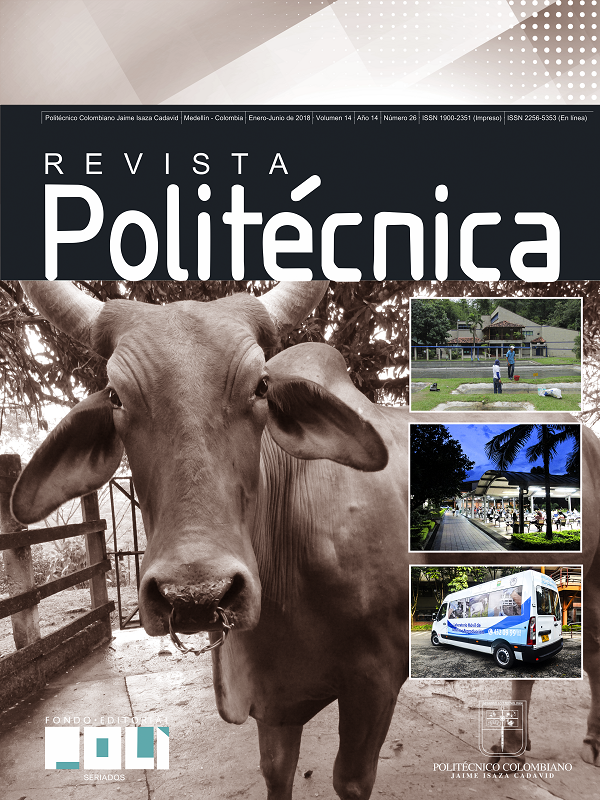Comprehensive approach of 21stcentury engineer: a literature review abstract
DOI:
https://doi.org/10.33571/rpolitec.v14n26a1Keywords:
Perfil del ingeniero, enfoque general del ingeniero, competencias, competencias profesionales, competencias genéricas, competencias específicas, ingeniería, ingeniero siglo XXIAbstract
Due to the growth and development of the 21stcentury engineer it is essential to know and identify the different approaches currently. The objective of this work is to present theresults of the research found in the systematic review of the literature, to identify the main approaches of engineering professionals. It concludes in six different approaches that together materialize the set of characteristics characteristic of the engineering activity, more specifically, of those who develop as a XXI Century Engineer. It is important to show in the results with greater degree of detail each of these changes found as it is: by competition, social, research, innovation, integral, professional that is part of the profile and professional characteristics.Article Metrics
|Abstract: 3887 | HTML (Español (España)): 4336 | PDF (Español (España)): 2407 | XML (Español (España)): 34 |PlumX metrics
References
G. Aquiles, Introducción a la ingeniería : la tecnología, el ingeniero y la cultura, Editorial. Buenos Aires , Argentina, 2014.
C. Hardy, Ingenieros y las Torres de Marfil. 1998.
B. Kitchenham, O. P. Brereton, D. Budgen, M. Turner, J. Bailey, and S. Linkman, “Systematic literature reviews in software engineering a systematic literature review,” Inf. Softw. Technol., vol. 51, no. 1, pp. 7–15, 2009.
M. Staples and M. Niazi, “Experiences using systematic review guidelines,” J. Syst. Softw., vol. 80, no. 9, pp. 1425–1437, 2007.
O. G. Ortiz, M. Elias, and V. Rozo, Introducció n a la ingeniería: Una perspectiva desde el currículo en la formación del ingeniero. Ecoe Ediciones, 2016.
L. L. C, “Gestión de las Competencias: Cómo Analizarlas, Cómo Evaluarlas, Cómo Desarrollarlas,” Ediciones Gestión, 2000.
P. Perrenaud, “Construir las competencias, ¿es darle la espalda a los saberes?,” Red U. Rev. Docencia Univ., no. Número monográfico I. Formación basada en competencias (II), pp. 1–8, 2008.
G. Le Boterf, “Gestión de las competencias,” Barcelona Editor. Gestión, 2002.
J. Aquilino et al., “Definición de competencias específicas y genéricas del Ingeniero en Informática,” pp. 1–9, 2006.
M. A. C. Gutiérrez and J. V. B. Olvera, “LOS ESTUDIANTES APLICANDO EL PERMA EN LA FORMACIÓN DE INGENIEROS POR COMPETENCIAS EN MÉXICO,” ANFEI Digit., no. 6, 2017.
S. Tobón, “Aspectos basicos de la formacion basada en competencias.,” Talca Proy. Mesesup, pp. 1–16, 2006.
B. Lazzarini and A. Pérez-Foguet, “Profiling research of the engineering academics who successfully promote education in Sustainable Human Development,” J. Clean. Prod., pp. 1–15, 2017.
W. de J. Gómez Acevedo and D. H. Bedoya Ortiz, “La responsabilidad cocreadora del ingeniero,” Revista Académica e Institucional de la UCPR, no. 78, pp. 107–123, 2007.
L. R. Vega-González, “La educación en ingeniería en el contexto global: propuesta para la formación de ingenieros en el primer cuarto del Siglo XXI,” Ing. Investig. y Tecnol., vol. 14, no. 2, pp. 177–190, 2013.
I. Acevedo Pérez, “Aspectos éticos en la investigación científica,” Cienc. y enfermería, vol. 8, no. 1, pp. 15–18, 2002.
H. Lacey and L. Alvarenga, “Los valores de la ciencia y el papel de la ética en la ciencia,” Real. Rev. Ciencias Soc. y …, pp. 241–246, 2008.
G. Ulloa, “¿Qué pasa con la ingeniería en Colombia?,” Ing. y Soc., vol. 2, pp. 38–41, 2010.
B. Motyl, G. Baronio, S. Uberti, D. Speranza, and S. Filippi, “How will Change the Future Engineers’ Skills in the Industry 4.0 Framework? A Questionnaire Survey,” Procedia Manuf., vol. 11, no. June, pp. 1501–1509, 2017.
F. G. González, “CONCEPTOS SOBRE INNOVACIÓN,” 2012.
I. Fernández de Lucio, “Ingeniería e innovación ∗ 1.,” 2006.
O.E.A, Ciencia, Tecnología, Ingeniería e Innovación para el Desarrollo, Segunda ed. Washington, D.C: OEA, 2005.
L. J. Tirado et al., “Competencias profesionales : una estrategia para el desempeño exitoso de los ingenieros industriales,” Rev. Fac. Ing. la Univ. Antioquia, vol. 40, pp. 123–139, 2007.
N. Bessis, X. Zhai, and S. Sotiriadis, “Service Oriented System Engineering,” Futur. Gener. Comput. Syst., vol. 80, pp. 211–214, 2018.
K. Blanchard and M. O. Connor, Administración por valores, Grupo Norm. Bogotá, 1997.
E. L. Ingeniero, C. O. N. Conciencia, U. N. A. Posibilidad, P. El, and D. Sostenible, “Engineer With Social Conscience .,” vol. 19, no. 2000, pp. 25–38, 2015.
J. M. G. Galo Bilbao, Javier Fuertes, “Ética para ingenieros,” S. A. Editorial Desclée de Brouwer, Ed. Bilbao, 2006, p. 303.
R. A. Pérez Gómez, A. A. Gamboa Suárez, and C. A. Hernández Suárez, “La ética en la formación del ingeniero de minas: representaciones sociales de actores educativos,” Rev. Tecnura, vol. 19, no. 44, pp. 201–208, 2015.
L. Rivas and J. L. UNEFA, “Conciencia Histórica Social,” Extr. http//es. scribd. com/doc/34498728/Conciencia-Historica-Social.[Links], 2002.
K. C. Ferreira and P. G. Lima, “Proyecto tuning América Latina en las universidades brasileñas: características y ámbitos en el área de la educación,” Paradígma, vol. 34, no. 1, pp. 083–096, 2013.
ABET, “ABET,” ANNUAL REPORT For Fiscal Year Ending September 30, 2014, 2014. [Online]. Available: http://www.abet.org/about-abet/publications/annual-report-archive/.
F. M. Palma Lama, E. A. Miñán Ubillús, and I. de los Ríos Carmenado, “Competencias genericas en ingeniería: un estudio comparado en el contexto internacional,” Actas del XV Congr. Int. Ing. Proy., pp. 2552–2569, 2011.
C. Selinger, Stuff you don’t learn in engineering school. Wiley-Interscience, 2004.



 _
_






















